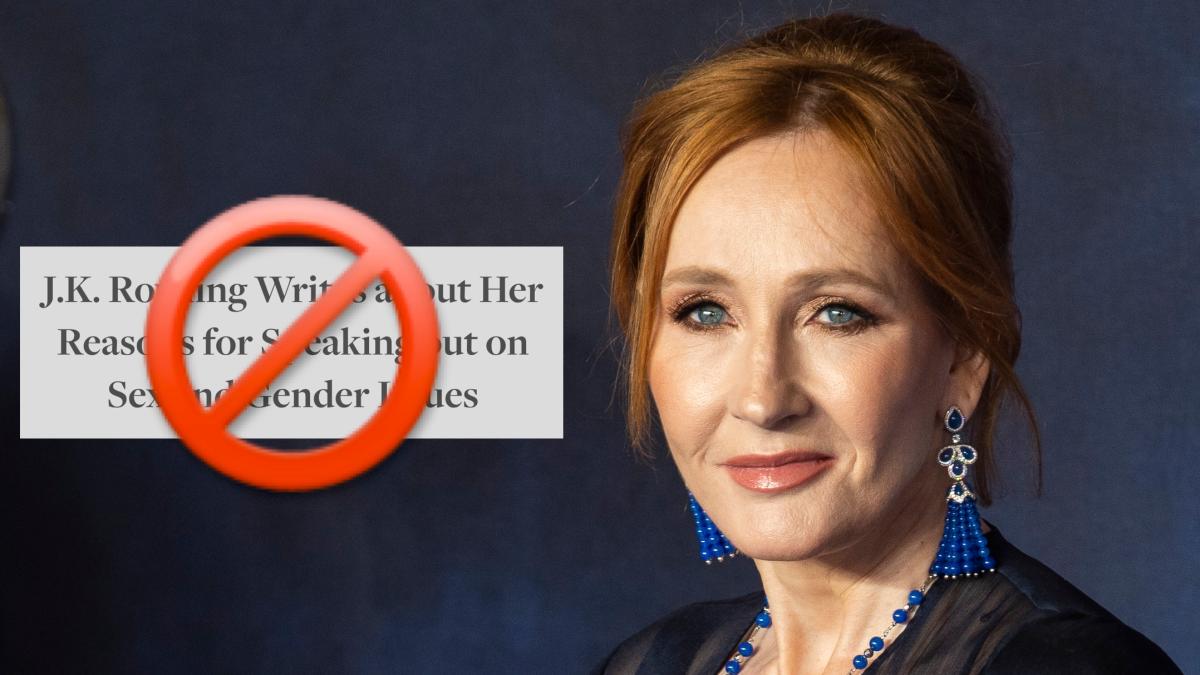
J.K. Rowling‘s latest work is an explanation. Not of the magical world she created in the Harry Potter series, nor of the crime thrillers she pens as Robert Galbraith, but an examination of the world she believes to be real: a world where cisgendered women are under attack, physically and politically, by transgender activists and their allies.
More to the point, it’s an explanation of why, exactly, she uses her enormous platform to argue that trans advocacy undermines cisgendered women altogether.
The clue is in the title. TERF Wars, published on her website Wednesday, suggests a battle between those fighting for trans rights, and the people who dare to challenge them, be they trans-exclusionary radical feminists or otherwise.
It’s a war Rowling believes she’s losing. She doesn’t appear to understand the damage that statements like hers can do to the other side.
Her essay is also packed with inaccuracies, TERF talking points, and wildly harmful statements, so I thought I’d fact check some of Rowling’s wilder claims.
Some of her key arguments, like the idea that trans-inclusive bathrooms boost safety risks, have already been debunked. For others, I turned to Sally Goldner AM, a media representative for advocacy organisation Transgender Victoria.
“We’re not threatening anyone, we are simply trying to live,” she said.
“We just want to be treated on our merits, and we’re happy to do the same.”
Rowling disabled responses to her essay on Twitter, the platform she prefers to spread her views. So, you’ll find my discussion with Goldner below. It’s been lightly edited for clarity.
JK Rowling literally wrote a book about a boy who’s a wizard, lives in a cupboard, can talk to snakes and fights off a man with no nose, but she can’t understand and respect trans or gender fluid people?!?!?
— Paladin (@PaladinAmber) June 11, 2020
PEDESTRIAN.TV: Rowling said theres a “huge explosion in young women wishing to transition” and an increase in folks looking to “detransition.” Is there any basis for these claims?
Sally Goldner: Well, let’s go through this step by step. So first of all, ‘huge explosion’ sounds, the way she’s putting it, comes across as judgmental. We just say that naturally, as there’s been more information about the truth of trans people as we’ve had some intergenerational learning, people now have more information with which to connect.
I’ll give a bit of my own story. As someone who was born in 1965, the information wasn’t there. It sounds wacky, but we didn’t have internet. So people now have that access. I mean, I know my story. I remember my first day at school and almost running away from the door of the classroom, because I spent all of my 13 years at school at what was called an all boys school. And I knew instantly something wasn’t right. Of course, I didn’t have the intellectual reasoning of it, but I knew my gut said something was wrong. So the reason for what she calls an ‘explosion’ is just the natural growth. There is more visibility and positivity for trans people – while acknowledging there’s a long way to go.
In terms of huge numbers “detransitioning”, there’s two parts to that one. The people who “detransition”, who have what I call “true regret”, is very minimal. Way less than 1% of trans people of all ages, regardless of how the person was assigned birth, and what gender they truly are, regardless of that. That needs to be put into context.
And second, some people “detransition”, to use her word – I will use the phrase “return to living the gender assumed for them at birth” – because of the prejudice of society, and various groups and components within it. There’s been plenty of evidence on that where people say “I’d still really like to be such and such a gender”, particularly trans women such as myself, but there’s too much prejudice: “My family’s disowned me or threatened to disown me,” that sort of thing. The solution to any alleged “detransitioning”, really, is to make sure that we have a society that treats people with respect and on their merits in relation to any aspect of gender.
P.TV: Rowling mentions a 2018 study which sparked the term “rapid-onset gender dysphoria” (Editor’s note: that paper has been heavily disputed, and the editor of the journal in which it first appeared issued an apology to the trans and gender variant community. You can read more the study’s fallout via BuzzFeed News). The study claims some young people can develop gender dysphoria by interacting with trans peers, and Rowling points to online communities, like Tumblr, Reddit, Instagram and YouTube, as hubs for this phenomenon. Does talking with trans friends have the capability to trigger gender dysphoria?
SG: The bottom line is that no one’s going to affirm a different gender identity if they don’t really need to. Again, it’s the same sort of judgmental approach as ‘explosion’, that JK Rowling herself has used. And that’s not accurate. People are able to be truer to themselves. It’s parallel to what we had 20 or 30 years ago with sexuality, this idea of “converting our children to homosexuality.”
Well, it’s the same sort of language, this “rapid-onset gender dysphoria”, this idea we’re converting our children to transgenderism. And I say that in the sort of fuddy-duddy talkback caller voice, because it’s just not true. We just are who we are. And in the past, people have been denied that. I think that there’s always been the same percentage of trans people for the whole population around the world, and for that matter, gay, lesbian, bi, but there has been isolation and a lack of connection. So this idea that people are suddenly turning transgender – and I’ll say very clearly that I’m being sarcastic – that the transgender community put something in the water supply, or the coffee, or something… I mean, seriously? It’s just not accurate.
https://twitter.com/elle_hunt/status/1270784027130298375
P.TV: Rowling cites studies claiming that up to 90% of gender dysphoric teens will “grow out” of it. Does Transgender Victoria have a position on that figure?
SG: No, that’s not accurate at all. And particularly the words “grow out.” Again, it comes back to the idea that a sense of gender identity, and expressing your gender in a way that is authentic to you, is vital in the end – that you can be that person for the sake of your holistic health and well being.
And again, it’s parallel to what happened with the gay and lesbian community 20 years ago. Always try to downplay the numbers. One more point on that: during the marriage equality postal survey, as much as we probably don’t want to remember it was happening, you’d see these people opposed to marriage equality saying, “homosexuals are point four of one percent of the population.” And it doesn’t matter what the figure is. It’s about treating people with respect. I’m of Jewish background, and we are point four of one percent of the population in Australia, but no one would justify anti-Semitism. So the numbers really don’t matter either. But it’s the denialism – that’s the real issue.
P.TV: Rowling also makes political arguments, at one point claiming “one of the objectives of denying the importance of sex is to erode… unifying realities that make [women] a cohesive political class.”
SG: We’re not denying that importance. We’re just saying that people’s gender identity and expression can differ from societal expectations, given how we’re assigned at birth in relation to our sex. So we’re not denying sex. We’ve never said that at all. We are very much aware of the issues facing people with intersex variations, which show there are more than two bodies at birth when it comes to sex characteristics. So we don’t want to deny that: that would be a double standard on our part. We value all sexes and all genders.
We’re not threatening anyone, we are simply trying to live. We just want to be treated on our merits, and we’re happy to do the same.
We in the trans and gender diverse community totally understand the situation of cisgender women, including what J.K. Rowling has been through, because women are often invalidated or treated negatively because of an aspect of their gender, and body, and so are trans and gender diverse people. Therefore, if J.K. Rowling has gone through any pain in relation to her being female, that’s not on.
But that is not an excuse to take her pain out on trans and gender diverse people, which is what we see happen too often.
I think that for all the stuff that’s put out about transgender people, that we’re trying to deny other people – I think if we looked at the real issue, which is that element of males who behave in ways that are chauvinistic, misogynistic, [displaying] toxic masculinity. We could put our energies towards getting better respect from them, because we’re all damaged by that. I think that’s really more important than anything else.
7b. I’ll stress again. Abuse is deplorable – but it does not license transphobia. Trans people receive this abuse (and far worse) every day – even more in the wake of Rowling’s recent tweets.
— 🤦♂️ Andrew James Carter (@Carter_AndrewJ) June 10, 2020
P.TV: She says that using language like “menstruators” and “people with vulvas” is inherently “dehumanising and demeaning”, linking it to misogynistic attacks: “For those of us who’ve had degrading slurs spat at us by violent men, it’s not neutral, it’s hostile and alienating.”
SG: I cannot agree with that. We’re wanting to be inclusive of everybody’s gender, everybody’s body. And to say that we’re spitting at women and then putting them down for a body part isn’t on… I struggle to understand how she reaches that conclusion.
If we talk about those assigned male birth in terms of prostate cancer, well, trans women, whether we have a lower surgery or not, we’ll always have a prostate. So to me, if I go to a prostate clinic and it says “working together for men’s health”, I’m not going to feel included.
Focusing on the needs of those who menstruate, and make sure they get, say, tampons in relevant bathrooms, is a statement of inclusivity rather than limiting anyone at all.
can’t stop thinking about this JK Rowling take. She does know that as it stands… ANY man can just… enter a women’s room… already… right? There’s no fuckin alohamora charm on the door protecting the women inside. Making them trans inclusionary is not a “C’MON IN MEN” siren pic.twitter.com/rZPwVHL8K4
— caitie delaney (@caitiedelaney) June 11, 2020
P.TV: She notes how the impacts of some diseases, like multiple sclerosis, can vary between bodies. She seems to be worried that trans activism could influence how those conditions are treated. Are those concerns justified?
SG: It doesn’t have to do that at all. It just doesn’t do that, full stop. We always say the thing to think is, “Do we need a certain piece of information? And if so, is there a justification?” So, we use the example if you’re, you know, at a local library to get a library card, do you need their gender? Maybe, but you certainly don’t need to know what they’re assigned at birth. It’s not really relevant.
But in some medical or sexual health situations, you might need to know about someone’s body, and there are discrete and respectful ways you can ask that: you can ask someone’s gender, then you can ask, “what sex were you assigned at birth? Male or female? Other? Please specify, or prefer not specify,” which gives everyone a fair chance.
While I try to be the best ally I can be for people with intersex variations, we need to acknowledge their sex is often erased, and we don’t want that to happen.
P.TV: What is your view on how Rowling has used her platform to promote these views?
SG: I think that any individual or organisation that has a platform needs to use it thoughtfully and responsibly, and in a more reflective way. It has the potential to damage trans people, whether it’s a prominent author like J.K. Rowling, or it’s elements of a certain commercial media company, whether it’s politicians, or religion. It’s all very well to talk about freedom, but the other side of the coin is responsibility. And I feel that she’s not weighing up her responsibilities, in this sense, when she’s not considering the situation for trans people.
When Daniel Radcliffe said “try to separate the author from the characters in the books,” I think that’s one thing that can help. But it’s really quite worrying. I mean, she’s saying she’s writing novels. Well, you do research for a novel. If you’re going to comment about trans people wouldn’t you talk, communicate with, and listen to trans voices before you commented, if it was going to be a responsible, nuanced approach?
The groups I mentioned, who seem, for whatever reason, to be “opposed” to transgender people, they have a right to their feelings. They do not have a right to take them out on trans people, and families, for that matter as well.
It can put vulnerable, younger, trans and gender diverse people at risk. It has potential to harm them. Older people who think it’s never going to change will become mistrustful or disillusioned, and think “It’s never going to get better.” And then we go through other things, acknowledging my privilege: I feel that I can’t just ignore issues that, say, trans women of colour face in America, you know, what is happening there, the further we go down the levels of privilege and other intersections with the trans community, it is going to have a potential for harm.
When someone like J.K. Rowling who has that privilege, including wealth, doesn’t use it responsibly, that’s an extra layer of negativity.
Rowling points to the abuse she‘s received in response to her comments but won’t acknowledge the similar abuses those comments have prompted towards the trans community.
And the community, unlike Rowling, are not insulated by billions of dollars and a literal castle.
— Jordan Raskopoulos (@JordanRasko) June 11, 2020
P.TV: Rowling is only one creator, though. How do you feel about the appearance of trans stories in pop culture more broadly?
As someone who’s been out for just over 25 years, I have seen an improvement of that. But I use the analogy of a semi trailer turning a corner, we’ve got some bit on the road we want to be on, and some still on the road we want to get off.
There are many other stories to tell. Stories at the intersection of Aboriginal and Torres Strait Islander people who, in Western language, are called trans and gender diverse, for example. The issues of trans women of colour, and trans people with disabilities, could perhaps get more attention as well. But we’re turning a corner.
If you’d like to talk about the issues raised in this story, you can call the QLife LGBTI peer support hotline on 1800 184 527 or chat online.
QLife operates between between 3pm and midnight daily.
Under 25? You can reach Kids Helpline at 1800 55 1800 or chat online.







